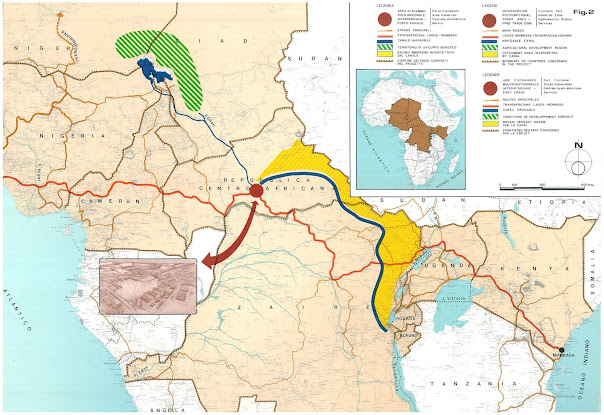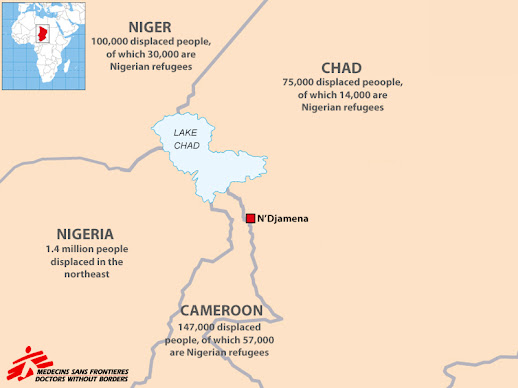Political Strategies to Promote the Transaqua Project
Hi! To pursue last week's argument on the feasibility of a water management cooperation, this post will look at the Transaqua project as an Intra-Basin Water Transfer (IBWT) initiative to ‘save the Lake Chad’.
The Transaqua project was first introduced in the late 1970s as a strategy of revitalisation of the Lake Chad by Bonifica, an Italian engineering firm (Sayan, Nagabhatla, Ekwuribe, 2020). It has been resumed in the 2000s as the Lake Chad Basin Commission (LCBC) placed the IBWT initiative at the top of its political agenda. The project proposes the recharge of the lake water supply by building a 2,400km-long navigable canal from the Congo Basin (Akanni, 2018). It plans on diverting about 30 billion cubical meters of water per year and 25,000 million kWh of hydroelectricity by the construction of numerous dams along the waterway (Adeniran, Daniell, 2020). The project also includes a new Lagos-Mombasa Highway which aims at improving the region’s position in global trade and its broader international reputation (Sayan, Nagabhatla, Ekwuribe, 2020). In other words, Transaqua has been presented as the multi-purpose, multi-scale, multi-actors’ solution to address the prevailing economic, political and social development issues of the Lake Chad region.
Its development and application include a number of key actors which highlight once again the interconnected nature of the hydropolitics in the Lake Chad Basin. The political governance, financing and technical expertise of the project are shared by global actors such the European Union, the African Union and China, supranational organisations such as the UNESCO and the African Development Bank, regional basin bodies such as the LCBC and the riparian actors (Adeniran, Daniell, 2020). The political instrumentalisation of the project relies on each actor’s own interest in the intrabasin transfer, from the launch of the Chinese Belt and Road Initiative (BRI), to better financial resources or increased national political power (Sayan, Nagabhatla, Ekwuribe, 2020).
Yet the politico-economic governance of the multivalent project is very complex as it needs to deal with both transnational instability around the Lake Chad Basin and transregional politics between West and Central Africa (Adeniran, Daniell, 2020). Indeed, there are obvious restraints, particularly for the Republic of Congo and the Congo Basin, on the environmental degradation and wildlife threats of the Congo River and Basin that would be generated by the intrabasin transfer. A widespread concern on the significant cost of Transaqua has further been raised as it is estimated at 70 billion USD (Adeniran, Daniell, 2020).
The actors involved in the project have been working on addressing the political challenges, most notably by using strategic discourses. The shrinking of the lake and the unfolding disastrous water and food crisis in the region have been greatly exploited by international and regional institutions to diffuse discourses of humanitarian crisis in which the Transaqua project appears as the ‘only solution’ (Sayan, Nagabhatla, Ekwuribe, 2020). The IBWT initiative has also been founded on narratives of sustainability by highlighting the ecological benefits the Lake Chad Basin’s recharged in terms of water flows and biodiversity (Adeniran, Daniell, 2020). Finally, the discourse of the lake depletion has been enhanced by an added ‘urgency’ aspect in order to fast forward the development of the Transaqua project (Adeniran, Daniell, 2020). The riparian states in favour of the project have further succeeded in making use of the region’s social, political and economic struggles into the broader water security agenda. Such strategies of ‘issue linkage’ have contributed in building a ‘discourse coalition’ to integrate Transaqua in the broader development programmes of security under the sake of Pan-Africanism (Sayan, Nagabhatla, Ekwuribe, 2020).
Finally, I have found deeply interesting the use of the emerging Nigerian leadership in the region to promote of the Transaqua project (Adeniran, Daniell, 2020). Indeed, Nigeria has used its relative political power over the other riparian states and its key role in the LCBC to foster the intrabasin transfer. The amplification of Nigerian leadership by the LCBC has enabled the realignment of the two key geopolitical actors, namely, the EU and China. Moreover, Adeniran and Daniell have expressed the ‘Nigerianisation’ of international political platforms such as the UN Security Council which has been used to advocate in favour of the IBWT agenda (2020).
The Transaqua project and its promotion strategies highlights the political omnipresence in the water agenda and broader development programmes at the continental, regional and national scales. It underlines the complexity of a cooperative water management in the Lake Chad region and further questions its feasibility.
Thank you for reading, I hope you stay safe during these challenging times!





Very interesting post! The Transaqua project seems like a great initiative, and finally a plausible solution to water-scarcity and other development issues in the region. Excited to keep on reading!
ReplyDeleteThanks! I hope you will :)
DeleteWhere is the USAs stance on the transaqua project?
ReplyDelete